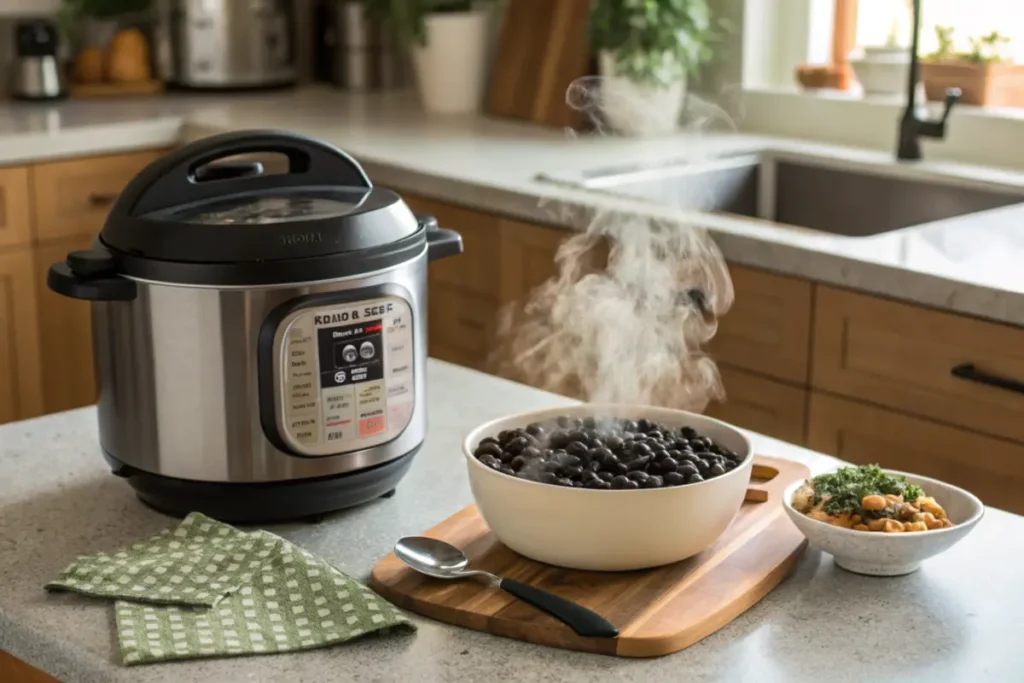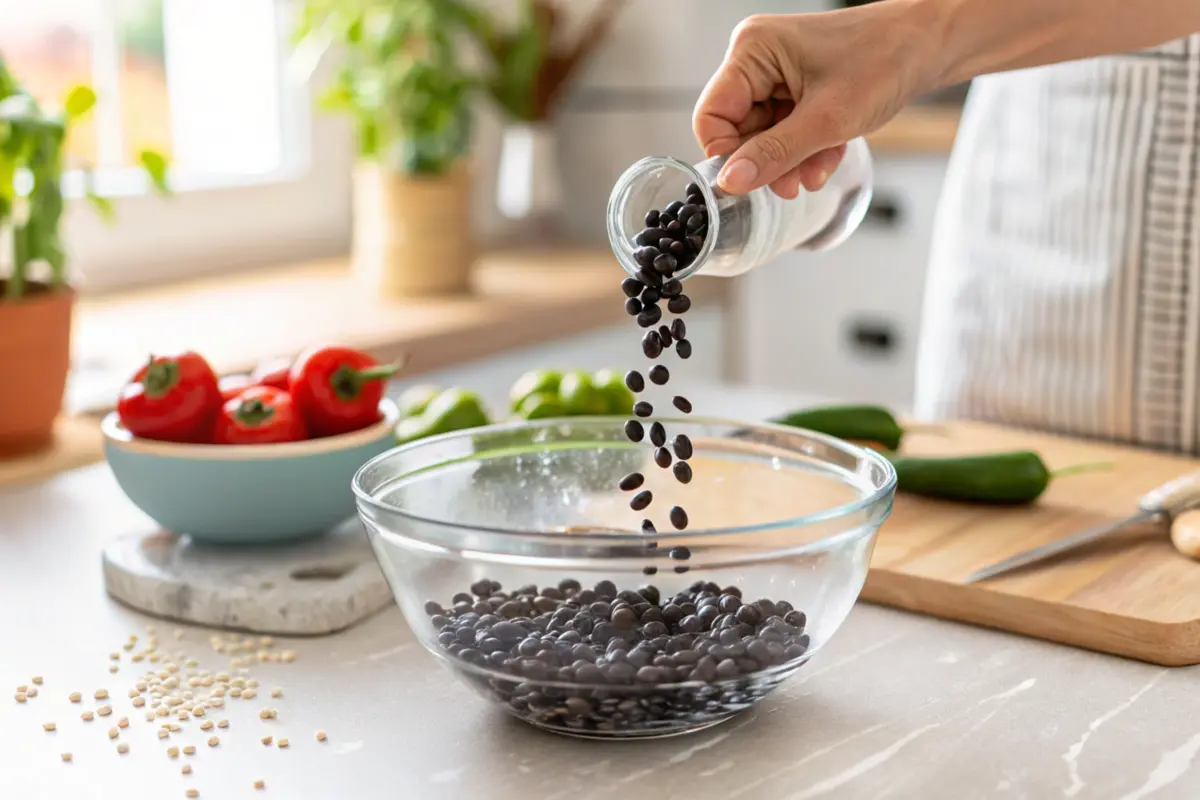When it comes to making delicious black bean soup, the question that often arises is: Do you need to soak black beans before making soup? This is a common point of confusion, especially for those new to cooking with dried beans. In this article, we’ll explore the reasons why soaking is sometimes recommended, the benefits it brings, and whether it’s absolutely necessary to soak black beans before cooking. Let’s dive right in.
Why Soak Black Beans?
The idea of soaking black beans before cooking has been around for generations. Soaking beans, in general, helps to soften them, allowing for quicker cooking times and improved digestion. For those preparing a purple black bean soup recipe, this step can be particularly helpful if you’re short on time. However, it’s not always mandatory, and there are benefits to either approach.
Soaking black beans can also help reduce certain compounds called oligosaccharides, which are known to cause digestive discomfort. Therefore, if you have a sensitive stomach, soaking your black beans may provide a gentler option when preparing your soup.
Is Soaking Necessary for Black Bean Soup?
The short answer is no, you don’t need to soak black beans before making soup. While soaking is a time-honored tradition that has its advantages, it’s completely optional depending on the cooking method and your available time. When you skip the soaking step, you can still achieve a fantastic bowl of black bean soup, but there are a few adjustments you’ll need to consider.
For those who want to make black bean soup without soaking, using a pressure cooker or an Instant Pot can cut down the cooking time significantly. Cooking black beans directly without soaking requires a longer cooking duration, but modern appliances help bridge this gap efficiently.
If you’re looking to try a recipe without the need for soaking, why not check out our guide to making purple black bean soup recipe? It’s an excellent way to enjoy rich flavors, and the recipe includes detailed tips on managing the cooking process without soaking the beans. You can find the full recipe here: Purple Black Bean Soup Recipe.
Pros and Cons of Soaking Black Beans
There are definite pros and cons to consider when deciding whether or not to soak black beans before making soup.
Pros:
- Reduced Cooking Time: Soaking your black beans overnight or for at least 8 hours can cut down the cooking time significantly.
- Improved Digestibility: By soaking beans, you help to break down some of the complex sugars that can be challenging to digest.
- Better Texture: Some cooks believe that soaked beans have a better texture when cooked, making them perfect for dishes like soup.
Cons:
- Additional Preparation: Soaking beans adds an extra step, which might not be ideal if you’re in a rush.
- Flavor Consideration: Some claim that beans cooked without soaking retain a deeper flavor.
Ultimately, the choice comes down to personal preference and time. If you’re looking for an easy-to-follow guide that doesn’t require soaking, our purple black bean soup recipe is a great place to start.
Cooking Black Beans Without Soaking

If you choose to skip the soaking process, don’t worry. It’s entirely possible to make delicious black bean soup without soaking your beans. Below are some helpful steps and tips for preparing black beans directly:
- Rinse the Beans: Always rinse your black beans thoroughly under cold water to remove any dirt or debris.
- Add Extra Cooking Time: Cooking time for unsoaked black beans can be about 60-90 minutes when using a stovetop. The exact time depends on the freshness of the beans and your altitude.
- Use a Pressure Cooker: This is one of the best ways to prepare black beans without soaking. A pressure cooker can cook dried black beans in about 30-45 minutes, making it a convenient option for those in a hurry.
- Seasoning Tips: If you’re cooking without soaking, consider adding aromatics like onions, garlic, bay leaves, or cumin directly to the pot. This will infuse the beans with more flavor as they cook.
For a more in-depth guide, check out this article from Bon Appétit which provides more cooking methods for beans.
Tips for Making the Best Black Bean Soup
Whether you soak your beans or not, the following tips will help you create an amazing black bean soup every time:
- Use Fresh Ingredients: The quality of your vegetables and aromatics, such as onions, garlic, and peppers, will greatly impact the final flavor.
- Don’t Skimp on Spices: Black beans pair wonderfully with spices like cumin, smoked paprika, and coriander. Adjust the seasoning to your taste.
- Add Acid at the End: Adding a splash of lime juice or vinegar at the end of cooking helps brighten up the flavors and adds a zesty touch.
- Thicken the Soup: You can blend a portion of the soup for a creamier texture while still keeping some whole beans for consistency.
If you’re interested in seeing these tips in action, follow our purple black bean soup recipe for an easy and flavorful dish.
Should You Soak Black Beans Before Soup? Final Verdict
In conclusion, soaking black beans before making soup is entirely optional. If you have the time and want to shorten cooking duration, soaking is beneficial. However, if you’re short on time or simply prefer not to, cooking black beans without soaking is perfectly fine and yields excellent results. The decision comes down to your preferences and how much time you have.
For those interested in a recipe that can be adapted to soaked or unsoaked beans, be sure to check out our purple black bean soup recipe, which offers step-by-step guidance for both methods.
The Science Behind Soaking Black Beans
To understand the process of soaking black beans better, it’s helpful to dive into the science behind it. Soaking beans involves immersing them in water for a prolonged period, usually overnight or for at least 8 hours. During this time, the beans absorb water, which helps break down the hard outer coating and makes them softer and easier to cook.
Soaking also helps to break down oligosaccharides, which are a type of carbohydrate that can be difficult to digest. By reducing these compounds, soaking can make the beans less likely to cause gas and bloating. The outer coating of black beans contains phytic acid, which is considered an anti-nutrient because it can interfere with the absorption of certain minerals like iron, calcium, and zinc. Soaking beans helps reduce the phytic acid content, making the nutrients more bioavailable.
For those interested in how soaking impacts the cooking process, consider that soaked beans tend to absorb flavors better during cooking. This is because the water content allows the cell walls to break down more easily, letting seasonings penetrate deeply. When making a soup like our purple black bean soup recipe, the enhanced flavor absorption can make a noticeable difference in taste.
Methods of Soaking Black Beans
There are a few different ways to soak black beans, each with its own advantages. Let’s look at the three primary methods:
1. Traditional Overnight Soak
The most common method is to soak the beans overnight. This requires planning ahead, as the beans need at least 8 hours to soak properly.
- Steps: Place the black beans in a large bowl and cover them with water. The water should be at least 2-3 inches above the beans, as they will expand while soaking. Let the beans soak at room temperature for 8-12 hours. Drain and rinse the beans before cooking.
- Pros: This method is the easiest and most effective for reducing cooking time and improving digestibility.
- Cons: Requires planning ahead and may not be suitable for spontaneous cooking.
2. Quick Soak Method
If you forget to soak your beans overnight, the quick soak method is an excellent alternative.
- Steps: Place the beans in a large pot and cover with water. Bring the water to a boil and let it boil for 2-3 minutes. Remove the pot from heat, cover, and let the beans soak for 1 hour. Drain and rinse the beans before cooking.
- Pros: Faster than the traditional overnight soak and still provides some of the benefits of soaking.
- Cons: Requires boiling, which adds an extra step compared to the overnight soak.
3. Hot Soak Method
The hot soak method is similar to the quick soak method but involves a longer resting period.
- Steps: Bring a pot of water to a boil, add the beans, and let them boil for 2-3 minutes. Remove from heat, cover, and let the beans soak for 4 hours. Drain and rinse before cooking.
- Pros: Effective at reducing oligosaccharides and cooking time.
- Cons: Still requires some planning and time investment.
Alternatives to Soaking Black Beans
If you decide not to soak your black beans, there are a few alternative cooking methods that will help ensure your soup is flavorful and tender. These methods include:
1. Pressure Cooking
Using a pressure cooker or an Instant Pot is one of the most convenient ways to cook black beans without soaking them. Pressure cooking reduces the cooking time significantly, which is perfect if you need a quick meal.
- Steps: Rinse your black beans thoroughly and add them to the pressure cooker with enough water to cover them by about 2 inches. Cook the beans under high pressure for 30-40 minutes, depending on the freshness of the beans.
- Pros: Significantly reduces cooking time and requires less active attention.
- Cons: Requires a pressure cooker, which not everyone has available.
2. Slow Cooker Method
The slow cooker method allows you to cook black beans directly without soaking, providing a hands-off cooking approach.
- Steps: Add the rinsed black beans to a slow cooker with enough water or broth to cover them. Cook on high for 6-8 hours or until the beans are tender.
- Pros: Very convenient for a hands-off approach and perfect for cooking overnight.
- Cons: Takes a longer time compared to other methods.
Common Myths About Soaking Black Beans
There are several myths surrounding the soaking of black beans, and it’s important to separate fact from fiction.
Myth 1: Soaking Beans Removes All Anti-Nutrients
While soaking beans does reduce the amount of phytic acid, it does not remove it entirely. Cooking the beans thoroughly also helps reduce anti-nutrients, but if you’re concerned about them, consider combining soaking with a long cooking time.
Myth 2: Soaked Beans Taste Better
Taste is subjective, and some people prefer the flavor of beans that haven’t been soaked. While soaking can enhance flavor absorption, unsoaked beans have a slightly richer, more intense flavor because their nutrients are more concentrated.
Myth 3: Soaking Saves So Much Time
Although soaking does reduce cooking time, the actual difference in modern kitchens equipped with pressure cookers or Instant Pots may not be significant enough to justify the effort, especially if you’re in a hurry.
Enhancing Flavor When Cooking Black Beans
Whether soaked or unsoaked, adding flavor to black beans is crucial to making a delicious soup. Here are some ways to enhance flavor during the cooking process:
- Aromatics: Add aromatics such as onions, garlic, carrots, and celery directly to the cooking water. These ingredients add depth to the beans and will make your soup even more flavorful.
- Spices: Black beans pair well with a variety of spices. Use cumin, coriander, smoked paprika, bay leaves, and thyme for a rich and complex flavor.
- Broth Instead of Water: Instead of cooking the beans in plain water, use vegetable or chicken broth. This will add an extra layer of flavor to the beans and elevate your final dish.
- Salt Timing: Adding salt too early can make beans tough. Wait until the beans are tender before salting them to achieve the best texture.
Storing and Reheating Black Beans
Black beans store and reheat very well, which makes them an excellent ingredient for meal prepping. Here are some tips for storing and reheating black beans:
- Refrigeration: Cooked black beans can be stored in an airtight container in the refrigerator for up to 5 days. Make sure they are fully cooled before refrigerating.
- Freezing: Black beans can also be frozen for longer storage. Store them in freezer-safe containers or zip-top bags for up to 6 months. When freezing, include a bit of the cooking liquid to prevent the beans from drying out.
- Reheating: To reheat black beans, add a bit of water or broth to the pan and warm them over medium heat. Stir occasionally until the beans are heated through.
Nutritional Benefits of Black Beans
Black beans are not only delicious but also packed with nutrients that are beneficial for your health. Here are some key nutritional benefits of black beans:
- High in Protein: Black beans are an excellent source of plant-based protein, making them an ideal choice for vegetarians and vegans.
- Rich in Fiber: Black beans are high in dietary fiber, which helps promote digestive health and can help reduce cholesterol levels.
- Packed with Antioxidants: Black beans contain anthocyanins, which are powerful antioxidants that help protect your body from oxidative stress.
- Iron and Folate: These beans are rich in iron and folate, which are essential nutrients, particularly for those who follow a plant-based diet.
For more information on the health benefits of black beans, visit Healthline’s article on black beans.
Conclusion: Soaking or Not, Black Beans Are Worth the Effort
Soaking black beans before making soup is a step that comes down to individual preference and convenience. Whether you soak them overnight or cook them directly, black beans can produce a delicious and nutritious soup that is well worth the effort. By understanding the benefits of soaking, the science behind it, and the various cooking methods available, you can decide which approach works best for you.
For those who prefer a complete, step-by-step recipe, be sure to try our purple black bean soup recipe. This guide offers options for both soaked and unsoaked beans, ensuring a tasty dish regardless of your chosen method.

